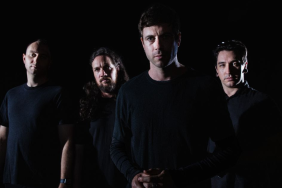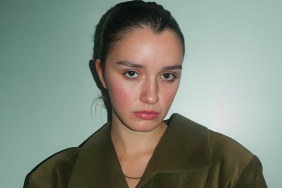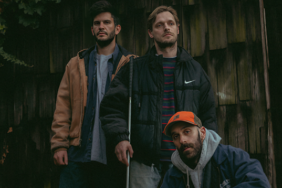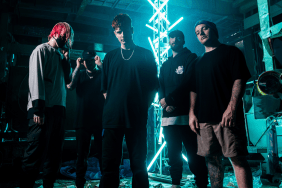The members of Brooklyn-based five-piece HAERTS hail from Germany, England, and the United States, together forming a tight unit that play a shimmering and almost mystical brand of synth-heavy indie-pop, and who’ve toured with the likes of Shout Out Louds, Atlas Genius, and Washed Out.
The band unveiled their debut EP, titled Hemiplegia, earlier this year to rave reviews, which lauded lead singer Nini Fabi‘s strong vocals and the band’s multi-layered songwriting and crystalline production, as well as the group’s in-the-pocket rhythm section and sweeping sonic textures.
The band have been hard at work at New York’s famous Electric Lady Studios crafting their debut full-length album and we managed to steal some time from singer Nini, guitar player Garrett Ienner, and keyboard player Ben Gebert to talk about the HAERTS’ background and their upcoming LP.
Music Feeds: Since the members of HAERTS come from different parts of the world, does each member bring with them a completely disparate array of influences? How does that impact the sound of the band?
Garrett Ienner: It’s the opposite. Despite where we grew up, I think we all have a very strong musical connection with each other and share the same aesthetic. We’ve all been exposed to and have been playing many types of music our whole lives, to a point where were can draw from all that we know without bias and reach for the same goal. There are exceptions of course. For example, Nini and Ben grew up with some German rock, which I laugh at every time I hear. Same with Derek and his obscure Britpop that I can’t stand. For me, it’s music that was happening in New York when I was a teenager – bands like Interpol – which the others don’t really seem to get. These are musical associations with a time and place that everyone experiences. I think the four of us though, independently from one another, distilled our listening past very similarly and we are naturally on the same page. It’s very obvious once you find each other. For us, it wouldn’t work any other way.
MF: Fabi has said that Brooklyn was an important home base for the band because it was important to not simply have music as an influence, but also a general cultural influence. Can you describe some of Brooklyn’s broader influence on the band?
Nini Fabi: Let’s maybe say New York City and not just Brooklyn. Benny, Derek and I live in Brooklyn but Garrett is across the river. HAERTS really started here and that is the obvious significance of the place. Whether you look at Garrett who grew up here and never turned his back on the city or the rest of us who came over at a certain point because we were magnetically drawn to it, we are all connected by the need to be here. We might not always love/hate the same things about New York but I think we are equally intrigued and stimulated by it. I know that New York and Brooklyn especially has changed drastically over the past 10 years and of course therefore lost some of its edge. Growing up in Munich, I personally still feel a certain roughness and sense of reality that makes me feel something, think, search and eventually communicate all of it through the music. The art and music scene in the city do play a big role. When you surround yourself by people who are sharing an experience and moving in a certain direction your work will inevitably be informed by that and in that way I feel that the culture we are in is crucial to us and keeps us going.
MF: Back in 2010, Patti Smith said that “New York has closed itself off to the young and the struggling.” She said it was no longer a creative hub for young artists. How would you respond to that?
NF: In the same interview she also said that the city had been “taken away” from the artists and that they should explore other places such as Detroit. It might be true to a certain extent, and New York in 2013 does not resemble New York in the 70s. I also love Detroit and agree that it is a great place to be creative right now (despite or maybe because of its issues), but I don’t think that moving on just because something has been “taken away” or “closed off” is the right path to take. Instead of going somewhere else, I feel the need to “take back” or “open up” the city for us, by keep doing what we do. That to me is the struggle of being a musician in New York today. I think that every time has its own problems and the most important thing is still to be free. I’ve always felt free here. Even though I love being a musician, I don’t think music should ever be easy and if it get’s easy I will know that I’m doing something wrong. Being a musician here takes focus, time and ultimately complete dedication and love for what you are doing. If you can accomplish those things in New York, I think you know that this is the only thing you will do, the thing you have to do. It’s definitely a challenge worth facing.
MF: The title of your debut EP — Hemiplegia — it’s taken from the lead track of the release, but could you elaborate on where the inspiration for the title came from and the decision to brand your debut as such?
NF: It’s always hard and I often try to stay away from speaking about the meaning of a song. I believe that once you are done writing a song it takes on a new life through other people listening to it and relating to it in their personally unique ways. Many of our songs don’t speak about something specific but they are all introspective in a way and all derive from personal experience. I don’t know how to write differently. Songs can start on a certain sentiment and then evolve into something else and when you’re done with it you sometimes find a whole new meaning that you never realized before. The biggest success would be to really carry through a thought, that’s what I would consider mastering a song or a lyric. Hemiplegia seems to be our specific title – “The partial paralysis of one side of the body”. I have a personal connection to it, but also wanted to use the word as a metaphor for being in a state of paralysis, numbness that inhibits you to act or move in the way you need and want to. Unlike its frightening effect the word itself has a very unique and smooth sound to it that was interesting for us as well. As far as making Hemiplegia the title of the EP, we chose it because we felt that it best showcases where we are now as a band sonically as well as emotionally.
MF: Reading your story, it seems as though getting together with Jean-Philip Grobler and working out of his studio heavily influenced the band, particularly with the introduction of electronic elements. What was the band’s sound like before getting together with Grobler and where would it have gone without him?
Ben Gebert: Jean was the first producer Nini and I had ever worked with, at a time when we felt the need to work with someone in order to push our music to where we wanted it to be. Our music was always rooted in the songs, but it used to have a lot of acoustic elements. Almost 3 years ago, we reached a point where we wanted to expand our palette of sound, both to serve the songs better as well as to challenge ourselves more. A lot of the HAERTS sound was achieved through experimentation. We did not set any rules when we first started recording. The process was very organic and we just followed our gut and the music we were influenced by. Of course Jean played a big role in the sense that he introduced us to a lot of the electronic elements, arrangements and he was a catalyst for a lot of our ideas. I’m not sure how we would sound without him. It’s the same like asking what do you think your life would be like if you had or hadn’t finished high-school––you’ll never know. The only thing we know is that we want to create something that touches people and is true to ourselves. Jean helped facilitate that because he believed in our songs as much as we believed in his ability to produce. Now a year later with the whole band involved, our sound has again evolved and I hope it continues to do so. We are collaborating more now as a band and have recently worked with another producer. I think this process of collaboration is an important part for us and it essentially started with Jean.
MF: You guys have said that Wings was chosen as the first song to be released because it is “rooted in songwriting.” With the final track containing so many elements, what does a HAERTS song look like when it’s first written and brought to the band?
GI: All the material is rooted in songwriting — if all the production were stripped away, you’d be left with music that could still be listened to and be meaningful. But the lines of production and songwriting have become very undefined. When HAERTS started, most of the production was built upon songs that were written with just voice and a piano or acoustic guitar. More recently though, the production is more integrated with the songwriting itself — certain synthesiser or guitar sounds or drum beats for instance have become a part of the compositional process. But the goal has never changed. The arrangement, or production, or whatever you want to call it, exists to amplify the emotion and core of the song.
MF: Following-on, how does a HAERTS live performance work? Is the sound different from the record? Is the band trying to get something different across during a live show?
GI: Because HAERTS began in the studio, when we first attempted to rehearse and perform the songs, the natural starting point was the recordings. But the more we performed the songs the more they developed, to a point where they took on a new life. It’s exciting when the studio process and the live process begin to inform each other. When you can see new possibilities in a song. After playing the material live for a while, we went back in the studio and added elements to the recordings that started to naturally happen when we were performing them. There is another song that we are working on which is an extreme example of this. We recorded it and people who are close to us in our circle loved the recording — until they came to one of our shows and saw it performed. Their opinion changed. They felt we needed to recut the song because the recording lacked the energy that we produced on stage. We all felt something was missing. We are still working on it, looking capture the missing element I feel that sound of the live show is similar to the sound of the recording. There are many elements we think are important to the song and want to present them on stage. But a live show should be its own thing. It’s not a replica of something else. We are trying to give ourselves and the music to the audience and affect them on some level. To achieve this you sometimes need to adjust the music to the context.
MF: You guys recently posted some pictures from the legendary Electric Lady Studios. Is this for the debut album? How have the sessions been going and what has it been like recording at Electric Lady?
GI: We feel so fortunate to have recorded at Electric Lady, in our city, and in a place where many of our favourite records were made. All of us had goosebumps when we went into the control room to drop off our equipment the night before our session. We are currently finishing our album and we went to Electric Lady to do a few songs with the producer Patrik Berger. As opposed to recording ourselves in our studio, working at Electric Lady allowed us to really focus on being musicians and to work on the songs without being distracted by the technical side of recording. We ended up tracking most of the material at Electric Lady live, as a band, much of it to tape. I think the studio really allowed us to capture a moment in a way that we weren’t able to do perviously.
MF: Do the band have plans to tour Australia some time soon? What experiences have the band had with or in Australia?
BG: We don’t have any specific dates yet, but we can’t wait to come over. We love Australia! Funnily enough, I am an Australian citizen. My grandparents emigrated after the war and therefore my mother was born just outside of Sydney. They moved to Germany when she was 6 years old but I’ve spent a few summers there as a teenagers and always felt connected in a way. Nini and I spent a lot of time over there traveling right after high school. So we really can’t wait to go back!
MF: What does HAERTS have planned for 2014?
GI: The main goal to is finish our debut album. We are almost there. Hopefully we will see you in Oz sooner than later.












